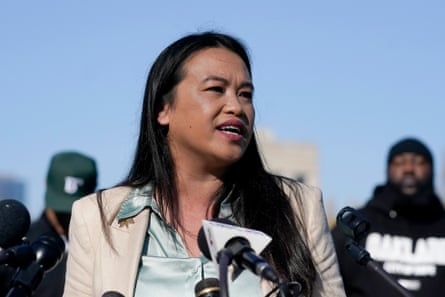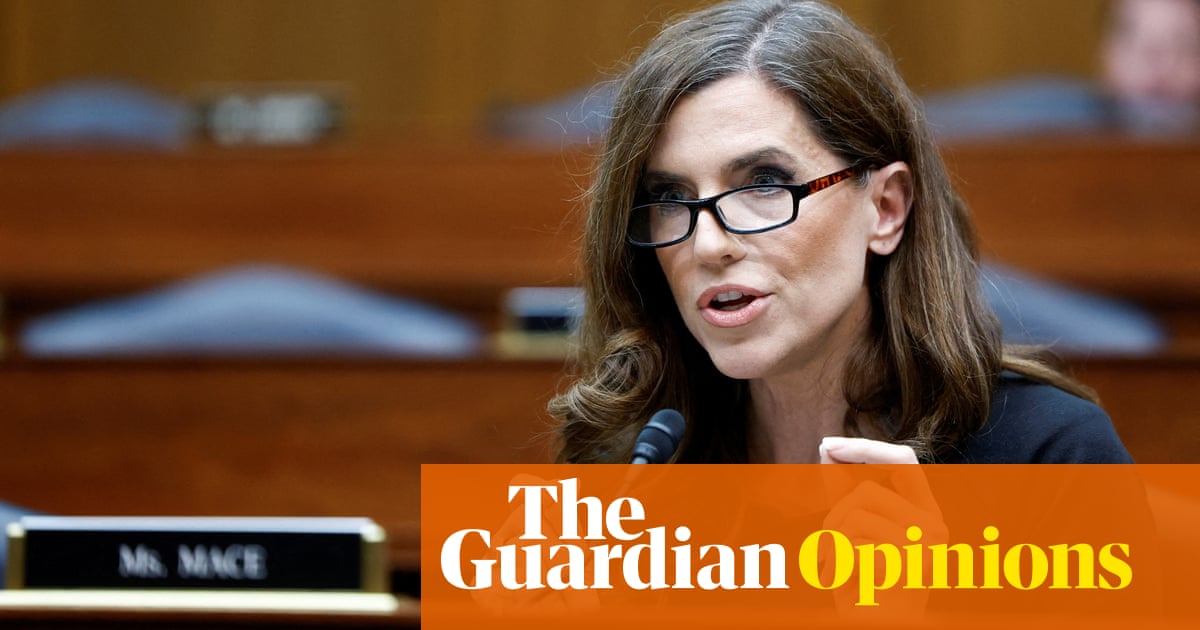Oakland mayor Sheng Thao’s political rise was precarious from the start.
For progressives, her narrow victory in 2022 affirmed their city’s radical, leftist roots. By electing a daughter of Hmong refugees and a domestic violence survivor who promised to advocate for the city’s most vulnerable residents, it seemed Oakland had defied the tech billionaires and venture capitalists who were working to transform the political landscape in neighbouring San Francisco.
Almost as soon as she was sworn in, her detractors were questioning the legitimacy of her leadership and called for a recount. Things only got messier from there.
This summer, just 18 months into Thao’s tenure, a recall effort against her qualified for the ballot – the first in Oakland in more than a century. Bankrolled by wealthy tech and crypto executives and a hedge-fund manager, the recall gave voice to voters who were furious over what seemed like a decades-long failure by city hall to fix everything from potholes to crime and homelessness.
“Since I’ve been here, I’ve never seen anything like this,” said Pamela Drake, a longtime activist and political commentator who moved to Oakland in 1968. “This recall is a reaction during a time when the whole country is in somewhat of a state of reaction, when the whole world is sort of chaotic.”
The town where Kamala Harris was born and launched a political career has been under a spotlight lately – or, perhaps, a microscope. National politicians on the right have all too eagerly cast it as a dysfunctional hellscape with runaway crime. But its struggles of late have been painfully real.

A spiralling housing crisis has driven hundreds of people into sprawling encampments. Acclaimed restaurants have closed, blaming crime and rising costs. And the city’s last remaining major league sports team has left Oakland’s crumbling Coliseum.
Many of the same groups backing the recall against Thao helped launch a recall effort against the county’s top prosecutor, the progressive Pamela Price.
“People are fed up with crime and homelessness,” said Dan Lindheim, a former Oakland city administrator and now professor at UC Berkeley’s Goldman School of Public Policy. “And they want to hold somebody accountable. It was like: ‘We don’t like what they’re doing, so – symbolically – it’s off with their heads.’”
It didn’t matter that homicides had spiked under Thao’s predecessor, and that neither Thao nor Price had direct or total control over the police department or crime rates. Nor does Thao have broad authority to quickly fix a housing crisis that has plagued nearly every corner of California. “But I don’t think this movement was sort of the sum of rational decisions,” Lindheim said. “I think it’s sort of an emotional tidal wave.”
Just one day after the effort to recall Thao qualified for the ballot, the city saw one of its worst mass shootings in years: fourteen people were shot at a Juneteenth celebration, after a sideshow – an illegal street takeover – developed nearby and fighting broke out.
As if to put a finer point on the city’s turmoil, the day after that, FBI agents descended on Thao’s home, carrying out boxes of evidence in an investigation that has neither implicated the mayor in any wrongdoing, nor absolved her of it. “It was just piling one thing on top of another,” Lindheim said. “That was the seal of death for her mayoral position.”
Two years into office, Thao has argued she’s just getting started. “We’re doing all this great work,” she told the Guardian in an interview. “The first year was about trying to figure out what our ills are, and finding solutions to our ailments. And now we’re seeing wins come in.”
At recent rallies and town halls, the mayor and her supporters have pointed to statistics that in Oakland, as in cities across the US, crime, and especially violent crime, has been declining. This summer, a report from the Major Cities Chiefs Association, which represents the police chiefs of big cities, found a 17% decrease in the number of Oakland’s homicides from January through June, compared with the same time period last year. The local news outlet Oaklandside reported that the number of robberies, assaults and rapes had also dipped.
They’ve questioned the extent to which the recallers’ grievances can be pinned to Thao, or any mayor. Crime was increasing before she took office, as was homelessness. The Oakland A’s – the town’s beloved major league baseball team – had been in talks to leave the city for years. Thao points out that she helped bring in the Ballers, an independent league team that began competing this summer in West Oakland.
She has contradicted her critics’ characterizations of her as soft on crime by pointing out that she has expanded surveillance and policing, by calling in state funds and resources. And – much to the chagrin of some of her progressive backers – she recently ordered the city to take a more aggressive approach to removing homeless encampments.

She also has insisted on her innocence in the scandal that followed the FBI’s raid on her house. Thao had said she is not the target of the investigation, but the agency has not publicly commented on the case, nor has it confirmed her claim. It has also raided properties of the politically powerful Duong family, who hold the city’s curbside recycling contract and who had previously been under investigation by the city’s ethics commission. Thao has called out the agency for refusing to clarify the situation and timing the raid so close to the recall. “It shouldn’t look like they’re putting their finger on the scale when it comes to elections,” she said.
Her arguments appear to have done little to quell broader anxieties about crime and calls for more policing. It hasn’t helped that even California’s governor, Gavin Newsom, has jumped into the morass, publicly urging Oakland’s leaders to change a policy to allow more police vehicle chases, after observing “criminals often fleeing with impunity”.
“Since taking office, Thao has shown herself incapable of handling the city’s most pressing challenges, while repeatedly deceiving the public about her actions and their consequences,” Seneca Scott, a recall organizer who also ran against Thao for mayor, said in a statement. “The effort to recall Oakland Mayor Sheng Thao isn’t about a single issue – it’s about a pattern of dishonesty, mismanagement and failure to provide effective leadership for the people of Oakland.”
Scott and other recall supporters frequently point to reports by the San Francisco Chronicle that Oakland’s police department had been publishing misleading crime data for years. “Overall crime rates have worsened under Thao,” he said.
But, at issue in the Chronicle report is the department’s weekly crime reports, which misstated some non-violent crimes. The Chronicle also found that the department had far overestimated violent crime.
Longtime activists see the recall efforts against Thao and the county’s progressive district attorney as part of a broader backlash against calls for reforms following the George Floyd protests against police brutality.
“I don’t know that there’s been any other time in Oakland besides that, where things had swung so far to the left,” said Cat Brooks, co-founder of the Anti Police-Terror Project.
During the George Floyd protests, thousands were screaming in the streets in support of defunding the police – and briefly, it seemed that officials at the local and national levels were starting to pay heed. “And so I think what we’re seeing right now is a really big swing to the right,” Brooks said.
Harping on the discontent are Thao’s longtime political detractors.
Mere days after the election, the moderate councilmember Loren Taylor, whom Thao defeated in the mayoral race, said Oakland’s ranked-choice voting system was a form of “voter suppression” – even though the system has been in use for decades, and got him elected to his own seat.
Taylor has continued his criticism of Thao, leading a group called Empower Oakland, which endorsed the recall, and vowing to run for election if Thao is removed. Thao’s predecessor, Libby Schaaf, who backed Taylor, has also endorsed the recall, telling KQED she believes Thao “is not capable of growing into the job”.
Another major critic is LeRonne Armstrong, the former chief of Oakland’s troubled police department, which for decades has been under federal oversight. Thao fired Armstrong after an investigation implicated him in systemic failures within the department and after he publicly accused the federal watchdog of corruption, without evidence. But Armstrong – who is now running for a city council seat – had been well-liked in Oakland, and his dismissal triggered a fresh wave of animosity toward the mayor.
Brenda Harbin-Forte, a former Alameda county superior court judge and police commissioner whom Thao removed after taking office, ended up leading the campaign against the mayor – focusing in large part on public safety and Thao’s dismissal of Armstrong.
Leaders within the Oakland chapter of the NAACP have also backed the recall, with Cynthia Adams, the chapter president, calling Armstrong’s firing a “modern-day lynch”.
“If you go down the streets of Oakland, it looks like a third-world country. Oakland never looked like this,” Adams told the Guardian.
Meanwhile, several current and former members of the NAACP chapter have said the group has been “hijacked” by conservatives.
Adding fuel to the recall effort’s momentum are hundreds of thousands of dollars from wealthy benefactors. Oaklandside revealed that the recall’s biggest funder was one man – Philip Dreyfuss, a hedge-fund manager who lives in the nearby wealthy enclave of Piedmont and was also top donor in the successful effort to oust San Francisco district attorney Chesa Boudin in 2022. Ron Conway, a billionaire tech investor who was also involved in the San Francisco recall effort, is another major funder.
In recent weeks, several prominent Democratic lawmakers have voiced their support for Thao – or, at least, their opposition to the recall. “The voters – through regular elections, not a few billionaires – are the ones with the power to ensure our democratic process remains strong and in place,” said Barbara Lee, a longtime, ranking member of the US House, representing Oakland and neighbouring communities.
“Except in rare circumstances of serious misconduct,” said Nancy Skinner, a state senator, “recalls are undemocratic and a waste of public funds.”
Thao, too, has been on the offensive, holding public rallies and town halls.
Whether it will be enough to fight off the challenge is unclear. At a public-safety town hall event in Oakland’s bustling Temescal neighbourhood earlier this month, Thao appeared alongside the city’s new police chief, fire chief and transportation director to reassure voters that things were getting better.
The city had managed to hire dozens of new 911 operators and was in the process of hiring more, and crisis call response times had gone down since Thao took office. Also, Thao had overseen the revival of Operation Ceasefire, one of the city’s marquee gun violence prevention strategies that had been watered down under the previous administration.
“We are seeing a decline in our crimes,” Thao told the crowd. “And we are seeing that we are intervening before crime actually gets started.”
Attendees, many of them members of the spiritualist church that was hosting the event, seemed dubious. Were the city’s new license-plate readers making any difference? When did they expect to fill the vacancies in the police department, and hire more officers?
There were stacks of notecards with questions about potholes, littered streets and illegal dumping. Thao and her team projected statistics showing that Oakland had fixed nearly as many potholes over the last fiscal year as it had during the entire 10-year period between 2008 and 2018.
Linda St Julian, 75, remained unconvinced. “I’m just so upset with how nasty the city has gotten. I’m just hurt to see my city go down like this” she said. “But I’ll be dead before they fix things.”
St Julian had already decided she was in favour of the recall; Thao hadn’t done enough to address crime or homelessness, she felt. Nor had Schaaf, a moderate who is now running for state treasurer. “I don’t like any of them,” St Julian said, shaking her head, referring to the city’s last several mayors.
Laux Williams, 37, agreed. The last mayor they felt had done a good job was Ron Dellums, who served from 2007-2011. Williams didn’t want to say whether or not they would vote to recall Thao – but said Oakland had been suffering. “I’m just waiting on a change,” they said.

 German (DE)
German (DE)  English (US)
English (US)  Spanish (ES)
Spanish (ES)  French (FR)
French (FR)  Hindi (IN)
Hindi (IN)  Italian (IT)
Italian (IT)  Russian (RU)
Russian (RU)  4 weeks ago
4 weeks ago
























Comments